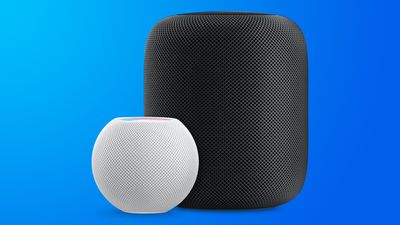Canalys: Apple 'Still Has Much to Prove' With HomePod Mini in Crowded Smart Speaker Market
A new report from Canalys has forecasted the global smart speaker market for next year, projecting that it will reach 163 million units, a growth of 21 percent.

Mainland China is expected to be the main market for smart speakers next year with a growth of 16 percent. The rest of the market is expected to grow by just three percent. In spite of this, 2021 is believed to be a much stronger year for smart speakers due to increased demand, as well as improved products and availability.
HomePod mini is presumed to pose a challenge to incumbent smart speakers, although Canalys Research Manager Jason Low says that the new device may yet face some challenges.
Apple still has much to prove to attract users, especially as the HomePod mini is up against other new US$99 devices, which are larger in size and with assistants perceived to be smarter. Apple must deliver its acclaimed premium user experience by leveraging its proprietary ecosystem of hardware, software and services. The HomePod mini would give its competitors a run for their money if the sound quality proves to be better despite its smaller size, and if the UWB and Intercom features work seamlessly for users.
It is also notable that Apple will be the only global platform vendor selling hardware and services within China.
"The US$99 (approximately CYN700) price segment is pretty much a no-mans-land in China, yet adequate to appeal to Apple’s user-base. Apple should take this opportunity to drive the uptake of its music and other services consumed at home," said Canalys Research Analyst Cynthia Chen.
The global smart speaker installed base is forecast to reach 640 million units by 2024, which Canalys says is "paving the way for the ambient computing paradigm shift."
Popular Stories
Apple's next-generation iPhone 17 Pro and iPhone 17 Pro Max are less than three months away, and there are plenty of rumors about the devices.
Apple is expected to launch the iPhone 17, iPhone 17 Air, iPhone 17 Pro, and iPhone 17 Pro Max in September this year.
Below, we recap key changes rumored for the iPhone 17 Pro models:Aluminum frame: iPhone 17 Pro models are rumored to have an...
The long wait for an Apple Watch Ultra 3 appears to be nearly over, and it is rumored to feature both satellite connectivity and 5G support.
Apple Watch Ultra's existing Night Mode
In his latest Power On newsletter, Bloomberg's Mark Gurman said that the Apple Watch Ultra 3 is on track to launch this year with "significant" new features, including satellite connectivity, which would let you...
The upcoming iPhone 17 Pro and iPhone 17 Pro Max are rumored to have a slightly different MagSafe magnet layout compared to existing iPhone models, and a leaked photo has offered a closer look at the supposed new design.
The leaker Majin Bu today shared a photo of alleged MagSafe magnet arrays for third-party iPhone 17 Pro cases. On existing iPhone models with MagSafe, the magnets form a...
The iPhone 17 Pro Max will feature the biggest ever battery in an iPhone, according to the Weibo leaker known as "Instant Digital."
In a new post, the leaker listed the battery capacities of the iPhone 11 Pro Max through to the iPhone 16 Pro Max, and added that the iPhone 17 Pro Max will feature a battery capacity of 5,000mAh:
iPhone 11 Pro Max: 3,969mAh
iPhone 12 Pro Max: 3,687mAh...
iOS 26 and iPadOS 26 add a smaller yet useful Wi-Fi feature to iPhones and iPads.
As spotted by Creative Strategies analyst Max Weinbach, sign-in details for captive Wi-Fi networks are now synced across iPhones and iPads running iOS 26 and iPadOS 26. For example, while Weinbach was staying at a Hilton hotel, his iPhone prompted him to fill in Wi-Fi details from his iPad that was already...
Apple today seeded the second betas of upcoming iOS 18.6 and iPadOS 18.6 updates to public beta testers, with the betas coming just a day after Apple provided the betas to developers. Apple has also released a second beta of macOS Sequoia 15.6.
Testers who have signed up for beta updates through Apple's beta site can download iOS 18.6 and iPadOS 18.6 from the Settings app on a compatible...
Apple's position as the dominant force in the global true wireless stereo (TWS) earbud market is expected to continue through 2025, according to Counterpoint Research.
The forecast outlines a 3% year-over-year increase in global TWS unit shipments for 2025, signaling a transition from rapid growth to a more mature phase for the category. While Apple is set to remain the leading brand by...
Apple is developing a MacBook with the A18 Pro chip, according to findings in backend code uncovered by MacRumors.
Subscribe to the MacRumors YouTube channel for more videos.
Earlier today, Apple analyst Ming-Chi Kuo reported that Apple is planning to launch a low-cost MacBook powered by an iPhone chip. The machine is expected to feature a 13-inch display, the A18 Pro chip, and color options...





















